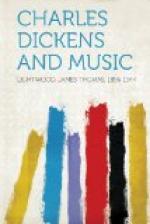This duet was founded upon the question little Paul Dombey asks his sister:
I want to know what it says—the
sea, Floy, what is
it that it keeps on saying?
WHEN HE WHO ADORES THEE (O.C.S. 35)
Words by Moore.
In Irish Melodies to the air ‘The Fox’s Sleep.’
WHEN I WENT TO LUNNON TOWN, SIRS (G.E. 15)
Probably original. The nearest I have found to it is—
THE ASTONISHED COUNTRYMAN,
OR,
A BUSTLING PICTURE OF LONDON.
When first I came to London
Town,
How great was
my surprise,
Thought I, the world’s
turned upside down,
Such wonders met
my eyes.
And in The Universal Songster—
When I arrived in London Town,
I got my lesson pat, &c.
WHEN IN DEATH I SHALL CALM RECLINE
Moore’s Irish Melodies.
In 1833 Dickens wrote a travesty called O’ Thello, in which is a humorous solo of eight lines, to be sung to the air to which the above is set.
WHEN LOVELY WOMAN STOOPS TO FOLLY (O.C.S. 56)
‘Do my pretty Olivia,’ cried she, ’let us have that little melancholy air your papa was so fond of; your sister Sophy has already obliged us. Do, child, it will please your old father.’ She complied in a manner so exquisitely pathetic, as moved me.
When lovely woman
stoops to folly,
And
finds, too late, that men betray,
What charm can
soothe her melancholy?
What
art can wash her guilt away?
(Goldsmith’s Vicar of Wakefield, ch. xxiv.)
WHEN THE HEART OF A MAN (D.C. 24, O.M.F. iii. 14)
Words by Gay (Beggar’s Opera). Set to a seventeenth-century air.
If the heart of a man is depressed
with care,
The mist is dispelled when
a woman appears,
Like the notes of a fiddle
she sweetly, sweetly
Raises our spirits and charms
our ears.
WHEN THE STORMY WINDS (D.C. 21, D. & S. 23)
Words by Campbell, who may have taken them from an earlier source. See ‘You Gentlemen of England.’
WHITE SAND (L.D. i. 32)
An old glee. See p. 106.
WHO PASSES BY THIS ROAD SO LATE (L.D. i. 1)
(Blandois’ Song.)
Words by C. Dickens. H.R.S. Dalton.
An old French children’s singing game. Dickens’ words are a literal translation. See Eighty Singing Games (Kidson and Moffat).




